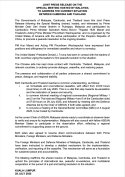Disputed land is only 4.6 square kilometers, other than that are undisputed area where, if Thailand claims those, will be considered as intruding.
I'm assuming you're referring to the
Preah Vihear temple here with regard to the
4.6 square kilometers of disputed territory.
However, what about the Cambodian-Thai border regions where i. the
Ta Moan Thom temple, as well as smaller adjacent temples, and ii. the
Ta Krabei temple are situated?
Are those territories no longer under dispute?
I don't think Thailand wanna be labeled as an intruder, especially in the ASEAN neighborhoods.
You're right that Thailand is incentivized to keep things amicable with its ASEAN neighbors.
However, unless ASEAN is both willing and able — as in
united enough — to economically sanction Thailand for occupying de jure Cambodian territory, the political and military elites running things in Bangkok will inevitably prioritize domestic political considerations over warm feelings in other ASEAN capitals.
In case Thailand has captured the 4.6 s.km and refuses to withdraw its force, Cambodia would not recognize its legal status either.
I don't have a horse in this race, so don't take what I say personally.
Unless the Preah Vihear temple is effectively situated on undefendable terrain, it's unlikely that the Thai military will withdraw from Preah Vihear without a broader political settlement.
Granted, there's a chance that Bangkok might agree to quietly withdraw without a de jure settlement — once domestic audiences have their attention focused elsewhere — if Phnom Penh agrees to refrain from exercising de facto sovereignty over Preah Vihear in the mean time.
However, that'd just be kicking the can down the road.
I wondered if china could have taken more initiative? Maybe host the cease fire so at least to be more prominent in the process and lessen US involvement.
TBH, wouldn't at all be surprised if China played a bigger role than the US in achieving this ceasefire agreement: this isn't a slight on America or an exaggeration of Chinese influence so much as a reality brought forth by trade and geography.
Though, unlike the current occupant of the White House, the Chinese authorities are generally speaking less concerned about taking credit for such outcomes.
Naturally, foreign diplomats and governments are going to make a lot more effort in acknowledging and flattering Donald Trump — than Xi Jinping or Wang Yi — even if it's largely, if not completely unmerited.



